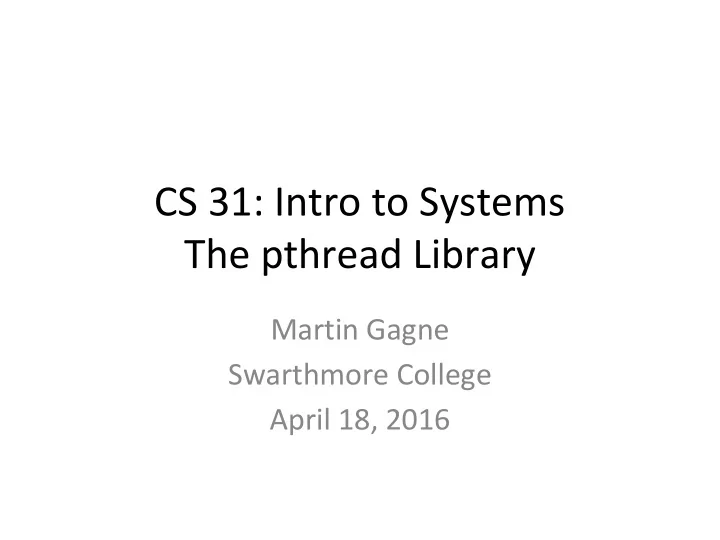

CS 31: Intro to Systems The pthread Library Martin Gagne Swarthmore College April 18, 2016
Thread operations • create • Starts a new thread, calling a specified function. • Returns the thread’s ID. • join • Block until a specified thread terminates. • Gives access to the thread function’s return value. • lock/acquire • Block until the mutex is available, then claim it. • unlock/release • Release a mutex. • barrier_wait • Block until a specified number of threads reach the barrier.
Some pthread library functions pthread_create pthread_join pthread_mutex_lock pthread_mutex_unlock pthread_barrier_wait
pthread_create Returns zero on success, nonzero First arg is on error. a thread ID pointer. Second arg is int pthread_create( usually NULL. pthread_t *thread, const pthread_attr_t *attr, void *(*start_routine) (void *), void *arg); Third arg is the thread function. Fourth arg is a pointer to the function’s args.
void* int pthread_create(…, void* args); void* : a pointer to any type (a generic pointer) • all addresses are the same number of bytes char *cptr; int *ptr ; // store 4 byte addresses • can pass the address of any type as a void * pthread_create( …, &x); // addr of an int pthread_create(…, &ch); //addr of a char • cannot de-reference a void * pointer x = *args; // store 6 in 1 byte? 2 bytes? 4 bytes? • re-cast first before dereference x = *((int *)args); // store 6 in 4 bytes 5
pthread_join Returns zero on success, nonzero First arg is a on error. thread ID to wait for. int pthread_join( pthread_t thread, void **retval); Second arg is a pointer to be filled with the return value.
Example 1 /* pthreads "hello, world" program */ #include <pthread.h> Thread attributes void* hello(void* arg); (usually NULL) int main() { pthread_t tid[2]; Thread arguments (void *p) pthread_create (&tid[0], NULL, hello , NULL); pthread_create(&tid[1], NULL, hello, NULL); pthread_join (tid[0], NULL); pthread_join(tid[1], NULL); return value exit(0); (void **p) } void* hello (void* arg) { printf("Hello, world!\n"); return NULL; }
Example 2 /* silly squaring pthreads program */ #include <pthread.h> #include <stdio.h> #include <stdlib.h> void* square(void* arg); int main() { pthread_t tid; int *res; int i=5; pthread_create(&tid, NULL, square, &i); pthread_join(tid, (void**) &res); printf("the result is: %d\n", *res); exit(0); } void* square(void* arg) { Why is it necessary that the int *sq; return value point to sq = malloc(sizeof(int)); dynamic memory? *sq = *((int*)arg) * *((int*)arg); return (void*) sq; }
Example 2 /* silly squaring pthreads program */ #include <pthread.h> #include <stdio.h> #include <stdlib.h> void* square(void* arg); int main() { pthread_t tid; Can someone find int *res; what is missing int i=5; from this code? pthread_create(&tid, NULL, square, &i); pthread_join(tid, (void**) &res); printf("the result is: %d\n", *res); exit(0); } void* square(void* arg) { int *sq; sq = malloc(sizeof(int)); *sq = *((int*)arg) * *((int*)arg); return (void*) sq; }
How can you pass multiple args to a function with pthread_create? You’d like to call this function when you start your thread: int find_max(int* array, int size); But the start routine has to have this signature: void* (*start_routine) (void*); How can you rewrite find_max as a start routine?
How can you pass multiple args to a function with pthread_create? struct thread_args{ int* arr; int size; }; void* find_max(void* arg){ int* arr = ((struct thread_args*)arg)->arr; ... } Use a similar trick to have multiple return values
pthread_mutex_t pthread_mutex_t m; // should be global // two ways to initialize (only do one) • m = PTHREAD_MUTEX_INITIALIZER; • pthread_mutex_init(&m, NULL); pthread_mutex_lock(&m); // critical section code pthread_mutex_unlock(&m); pthread_mutex_destroy(&m);
pthread_barrier_t pthread_barrier_t b; // should be global // initialize with number of threads pthread_barrier_init(&b, NULL, n_threads); // section of thread parallel code pthread_barrier_wait(&b); pthread_barrier_destroy(&b);
In-class example of hello.c cd ~/cs31 mkdir week12 cd week12 cp –r ~mgagne1/public/cs31/week12/* . cd week12 make ./hello 10 # run a few times & try with diff num vim hello.c main: pthread_create(&tids[i], 0, thread_hello, &tid_args[i]); // creates a thread (thread_hello is function it will run) thread_hello: // each spawned thread’s “main” function count += i; // count : a global var, all threads can access // i is local: each tid gets copy on // its private stack
More pthread library functions • Exit a thread (can also return from thread function) pthread_exit • Wait until another thread sends a signal pthread_cond_wait pthread_cond_signal • These are tricky. We’ll do an example next week.
Exercise: implement your parallel algorithm for max. Write c code using pthreads for main and a thread function that uses pthread_create and pthread_join. • Array size: 10,000,000 struct thread_in { int *arr; • 5 threads int th_num; } • Version 1: each thread returns its local max • Version 2: threads compare each value to global max
Example 2 /* silly squaring pthreads program */ #include <pthread.h> #include <stdio.h> #include <stdlib.h> void* square(void* arg); int main() { pthread_t tid[2]; int *res; int i=5; pthread_create(&tid[0], NULL, square, &i); pthread_join(tid[0], (void**) &res); printf("the result is: %d\n", *res); free(res); exit(0); } void* square(void* arg) { int *sq; sq = malloc(sizeof(int)); *sq = *((int*)arg) * *((int*)arg); return (void*) sq; }
Exercise: update your max solution to find the K largest items. Write c code using pthreads for main and a thread function that uses pthread_create, pthread_join, and appropriate synchronization. • Array size M • N threads • Fill an array with the K largest items Try this one on your own!
Up Next • Synchronization for common thread patterns • Deadlock
Recommend
More recommend